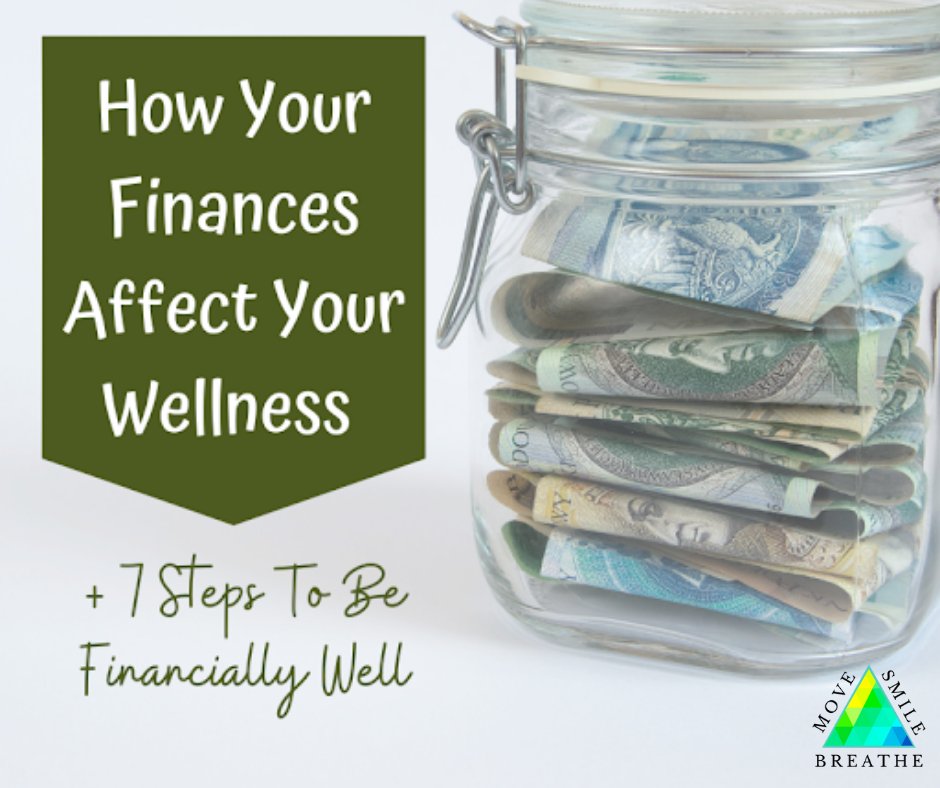Money can be a stressor in life and your finances can affect your overall wellness.
Our finances impact the jobs that we choose, where we live, what we drive, what leisure activities and vacations we enjoy, and our level of stress in meeting financial responsibilities.
Money cannot buy you happiness (or love.)
Money is a tool – not an end in itself. But having a healthy relationship with money can allow you to avoid financial stress and anxiety while also allowing you to pursue things that bring you happiness.
Your financial wellness is based upon your level of “satisfaction, independence, and peace with your current and future financial situation.”
So let’s take stock on how your finances affect your wellness.
7 Tips to Be Financially Well:
💰 Identify what financial wellness looks like to you. Practice mindfulness with your money.
💰 Complete a financial assessment. Take a look at your income, expenses, debt, etc.
💰 Create a budget. Identify areas of spending that can and should be changed.
💰 Proactively decrease debt. Studies show that individuals with a high level of debt experience significant increases in anxiety, depression, and other stress-related health issues.
💰 Identify goal-oriented savings. Are you saving for a new car? Setting aside money to redo the kitchen? This is a saving that you will eventually use for a specific purpose.
💰 Identify safety net savings. This is a saving that is not directed at a specific future purchase, but one that you want to grow so that you have a safety net for unexpected financial needs. (Medical, change in employment, unforeseen expenses, etc.) Dave Ramsey calls this your emergency fund. Ideally, you want at least 3 months of income in this fund.
💰 Save a little space in your budget for a splurge from time to time. Financial wellness is based on your CURRENT financial setting as well as your future position.
It’s not all about the Benjamins… but having a mindful and healthy relationship with your finances will undoubtedly increase your overall health and wellness.
Grab our free wellness assessment here.
Comment below with your favorite way to save money, budgeting trick or financial tip!

Looking for more help with finances? Have you tried Dave Ramsey’s program, Financial Peace? (We get a small incentive from your purchases made through our affiliate links.) We have attended classes at our church that walks you through the program. Lots of churches offer the program. You can find locations near you here and virtual classes here.

Comments
One response to “How Your Finances Affect Your Wellness”
I have not attended Dave Ramsey’s classes but rather lived frugal since childhood. Luxuries take on a total different meaning. I was born in an era that introduced credit cards and using other peoples money. Loan sharks or places where you borrowed money and then paid back a high percentage for a small loan were born. Grandma Nation was were you saved for those necessities till you could buy them out right.
Along came the Sear’s wish books or catalogs where merchandising become dreams or want lists. Then came layaways and as that vanished credit cards.
Excelling on a job was important. Satisfaction to a career was a goal. As world war II ended the workforce changed but in answer to satisfaction in a career we get out of it what we put into it. Debt versus financial security is achievable by understanding who you owe and why you owe that amount. Separating your wants from your needs takes honesty up front. How you budget shows how you value your earnings. In todays times we have a generation that was not educated in understanding the true value of a dollar in my opinion. Yes it has to be taught in the home and in the school . There is a misunderstanding on entitlements as nothing is free. Debit card addition needs training assessment. Dave Ramsey opened up minds by teaching common sense where finances are concerned. Many families have no clue as to their actual debt. Many never balance their bank account.
Cash on hand or for an emergency is a rare commodity in a generation from 30 to 50 years of age. Valuing the money you earn is taken for granted. Job loss used to mean having at least enough money to care you thru 3 months.
Bankruptcy is too easy to file in this day and time. Credit scores mean nothing to people who do not understand the dollar. Dignity means money wise being in a position of carry your own debt wisely